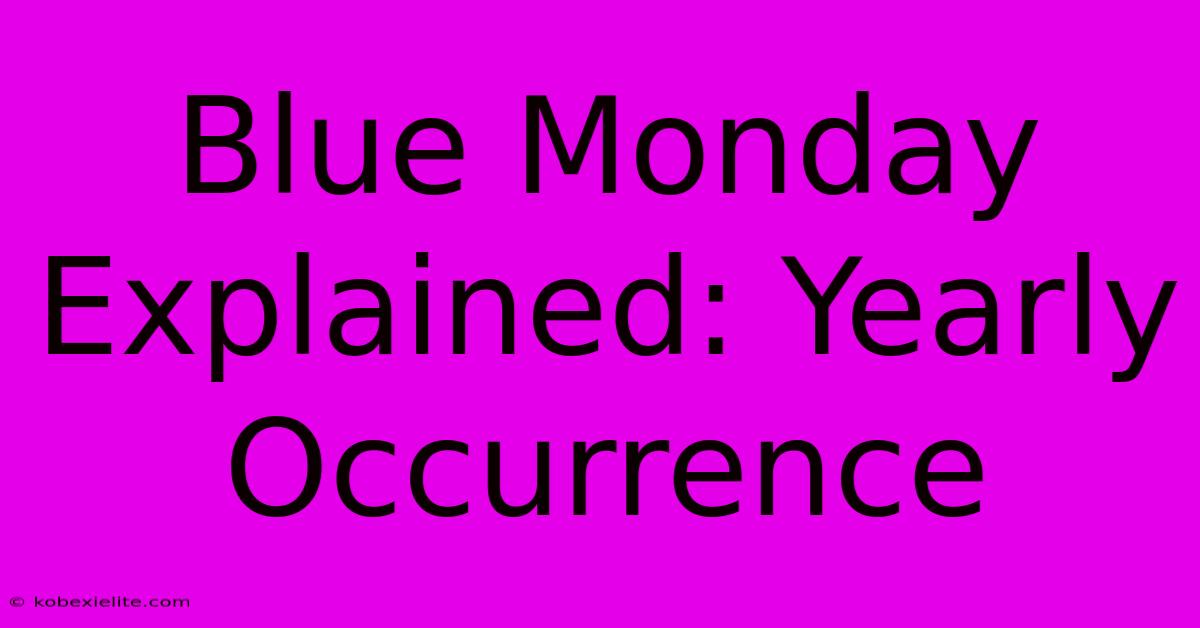Blue Monday Explained: Yearly Occurrence

Discover more detailed and exciting information on our website. Click the link below to start your adventure: Visit Best Website mr.cleine.com. Don't miss out!
Table of Contents
Blue Monday Explained: Yearly Occurrence
Blue Monday. You've likely heard the term, perhaps muttered it yourself on a particularly dreary January day. But what exactly is Blue Monday, and is there any real science behind this supposed "most depressing day of the year"? Let's dive in and unravel the truth behind this widely discussed phenomenon.
What is Blue Monday?
Blue Monday is a purportedly the most depressing day of the year. It's typically pegged to the third Monday of January. The concept gained traction in the early 2000s and has since become a widely recognized (though often debated) cultural touchstone. The idea is that a combination of factors — post-holiday debt, poor weather, failed New Year's resolutions, and the general bleakness of winter — contribute to a collective low mood.
The "Formula" Behind Blue Monday
The origin story of Blue Monday is often attributed to a formula created by psychologist Cliff Arnall in 2005 for a travel company. This formula, however, is widely considered pseudoscience. While Arnall himself has since distanced himself from the claims, the idea persists. The supposed formula involved factors like weather conditions, debt levels, time since Christmas, motivation levels, and the need to take action. It's crucial to understand that this formula lacks rigorous scientific backing and is not supported by the broader psychological community.
Criticisms and Debunking Blue Monday
Many experts strongly criticize the concept of Blue Monday. Their arguments center on the following points:
- Lack of Scientific Evidence: There's no credible scientific study to support the claim that one particular day is inherently more depressing than any other. Mood is complex and influenced by a multitude of individual factors, not a single, simplistic formula.
- Marketing Ploy: The original formula was created for a travel company, leading many to believe it was a clever marketing tactic to boost winter bookings. This casts significant doubt on the scientific validity of the concept.
- Oversimplification of Mental Health: Reducing the complexities of mental health to a single day ignores the significant challenges faced by individuals struggling with depression and other mental health conditions. It's a disservice to the seriousness of these issues.
The Reality of Seasonal Affective Disorder (SAD)
While Blue Monday lacks scientific merit, it's important to acknowledge the existence of Seasonal Affective Disorder (SAD). SAD is a type of depression that occurs during specific seasons, most commonly winter. Symptoms can include low mood, fatigue, and difficulty concentrating. If you are experiencing symptoms of SAD or any other form of depression, it's vital to seek professional help. Don't let the misconception of Blue Monday overshadow the importance of addressing real mental health concerns.
Coping with Winter Blues
Whether you believe in Blue Monday or not, many people experience a dip in mood during the winter months. Here are some healthy ways to cope:
- Increase Sunlight Exposure: Sunlight helps regulate our body's natural rhythms and can improve mood. Try to spend time outdoors each day, even if it's just for a short walk.
- Exercise Regularly: Physical activity releases endorphins, which have mood-boosting effects.
- Maintain a Healthy Diet: A balanced diet contributes to overall well-being and can help stabilize mood.
- Prioritize Sleep: Aim for 7-9 hours of quality sleep each night.
- Connect with Others: Social interaction is crucial for mental health. Spend time with loved ones, and don't isolate yourself.
- Seek Professional Help: If you're struggling with persistent low mood or other mental health symptoms, don't hesitate to reach out to a mental health professional.
Conclusion
Blue Monday, while a widely discussed phenomenon, is ultimately a marketing invention lacking scientific basis. While it may resonate with some individuals experiencing winter blues, it's crucial to remember that mental health is complex and requires a nuanced understanding. If you're struggling with your mental health, remember that you are not alone and help is available. Focus on self-care and reach out to professionals if needed. Let's replace the misleading notion of Blue Monday with a focus on genuine mental well-being and support for those who need it.

Thank you for visiting our website wich cover about Blue Monday Explained: Yearly Occurrence. We hope the information provided has been useful to you. Feel free to contact us if you have any questions or need further assistance. See you next time and dont miss to bookmark.
Featured Posts
-
Zay Flowers Misses Divisional Round Game
Jan 20, 2025
-
Leeds Win Midfield Duo Shine In Sheffield
Jan 20, 2025
-
Premier League Ipswich Vs Man City Live Updates
Jan 20, 2025
-
Free Agent Reliever Joins Dodgers
Jan 20, 2025
-
Trumps 2005 Star Photos
Jan 20, 2025
